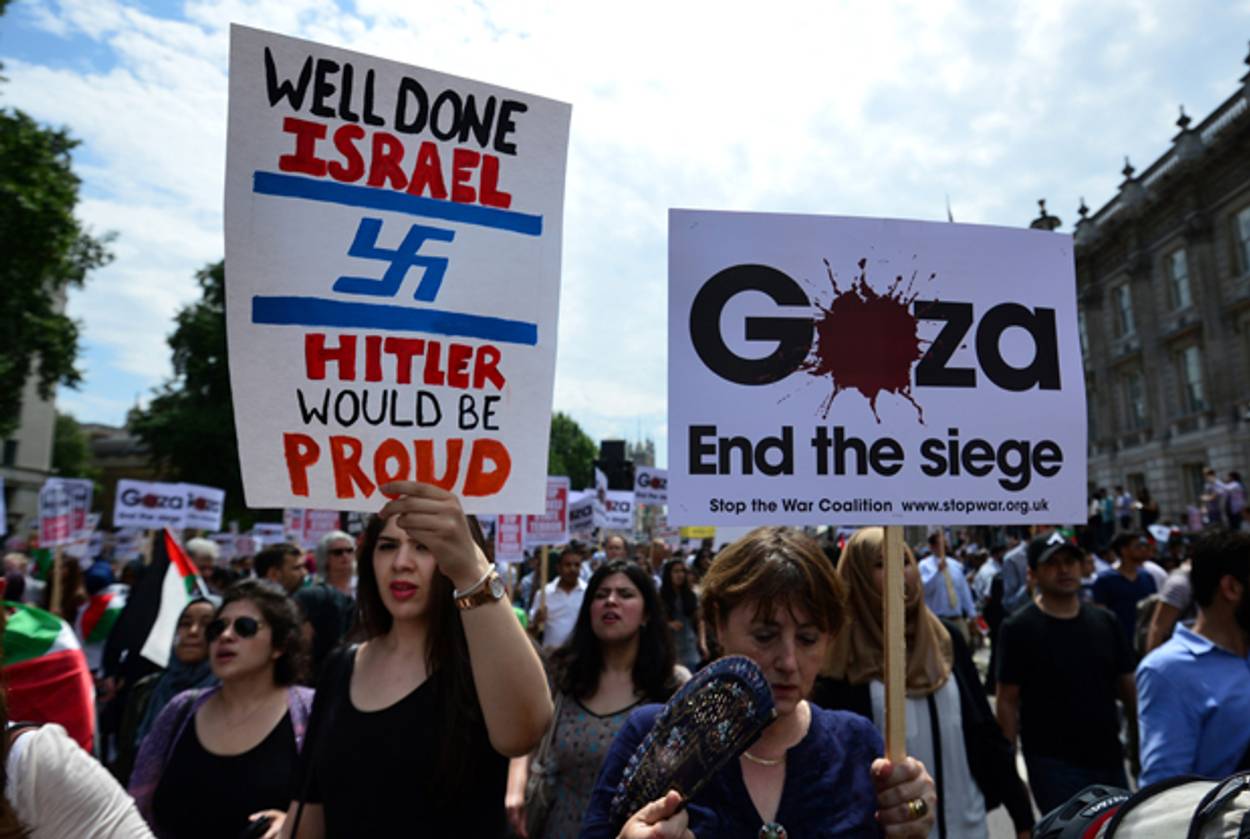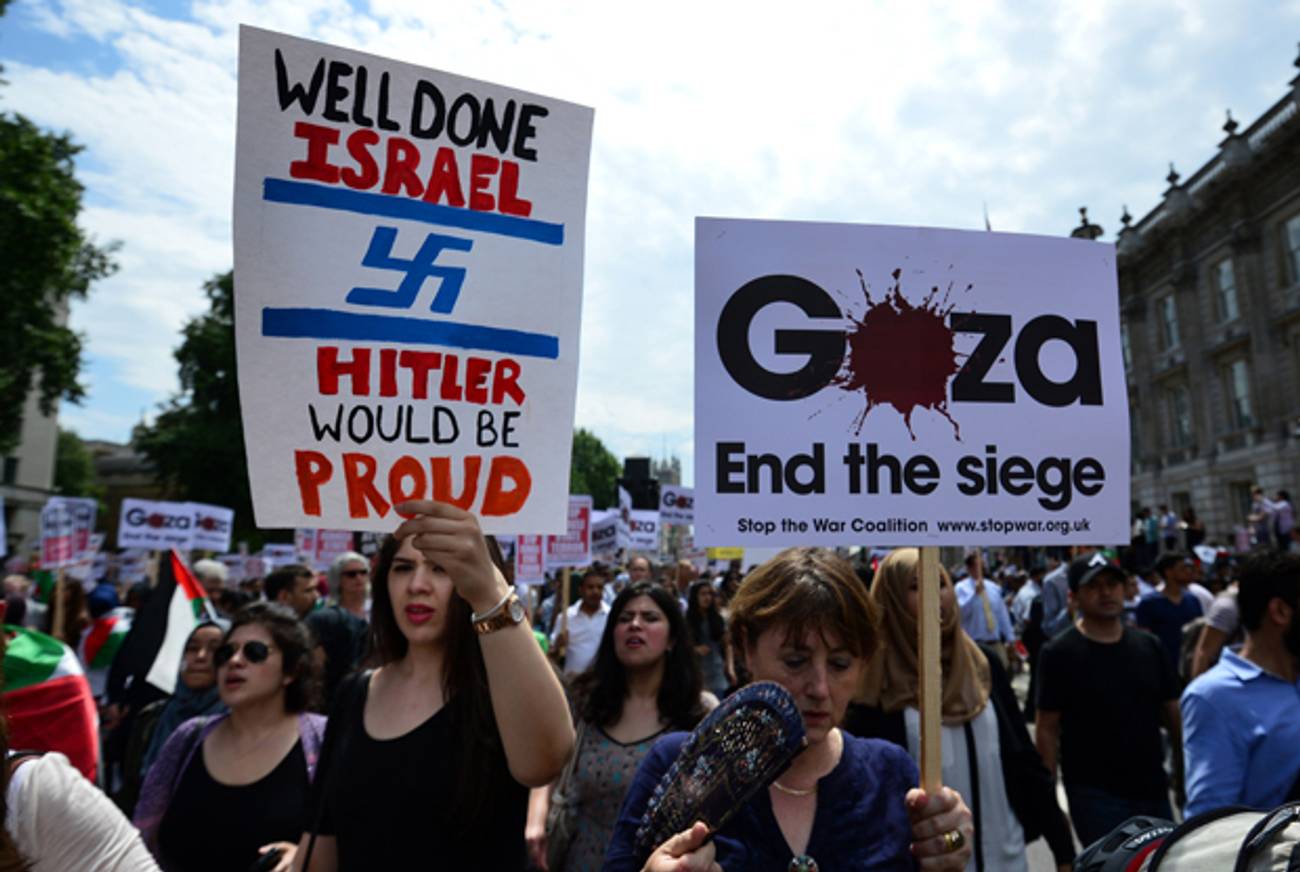Crisis of Confidence for British Jewry
Britain’s Jews cope with anti-Semitic backlash triggered by Gaza operation




The British Jewish community is suffering a crisis of confidence, its sense of security shaken by the anti-Semitic backlash triggered by the Gaza war. The last month has produced a spike in recorded antisemitic incidents: in Scotland, more in one week alone than in the whole of last year. Synagogues have been defaced; a protest was even planned (though later called off) opposite Cambridge Synagogue. Signs comparing Israel to Nazi Germany have been depressingly commonplace. A branch of the grocery store Sainsbury’s briefly removed its kosher section, for fear the food would be destroyed by protestors outside, as had happened in other supermarkets.
Together, these events have left many Jews scratching their heads, bewildered. It would hardly be an exaggeration to say that they have triggered a potentially debilitating collapse of morale. This sense of anxiety was most visible at a town hall-style meeting two weeks ago, in which the community leadership was attacked for its failure to lead. The hope that life will continue as usual, including the freedom to retain and celebrate ties to the Jewish state, has been shattered.
The media have begun to treat anti-Semitism in Britain as a major story, with coverage of it gracing the front page of the Sunday Times. The Guardian reported that rising anti-Semitism in Europe is the ‘worst… since the Nazis’; an editorial insisted that Jews should not be ‘required to declare their distance from Israel as a condition for admission into polite society’: tolerance towards Jews was now ‘a test for all of us’. Such media attention confirms that the fear of anti-Semitism is not just a creation of our community’s own paranoid minds.
Britain’s most prominent Jewish journalists have written about their anxieties. For Times editor Daniel Finkelstein, British Jewish life represents “high point in Jewish civilization”—but now, for the first time in his life, he worries about walking to synagogue on Rosh Hashanah. A member of the House of Lords, he admits he would be “lying” if he said he did not understand the “niggling feeling that it might be a good idea to keep a suitcase packed”. Columnist Hugo Rifkind—previously “comfortable as anything” in non-Jewish British society, the son of a former foreign secretary—wrote that he feels lonelier as a Jew today than when he was the only Jew at school growing up. In the Guardian, Hadley Freeman warned Europe that ‘some of its roots are showing’, insisting that ‘nobody… has the right’ to tell Jews what to think about Israel. In the Telegraph, women’s editor Emma Barnett broke her journalistic silence on Israel to write that she now feels “scared” to talk about Israel as a British Jew because the situation on the continent is just so ghastly.
The younger generation feels this too. Oxford student Richard Black has written that he feels “like a stranger” in his own country: “if we Jews wish to continue to live happy lives in Britain then it must come at the price of publicly dissociating ourselves from Israel”. Warwick student Jordan Jacobs has said that his “fantasy of living a normal British life, with the added advantages of being Jewish, has been crushed”.
Activists held a protest outside the Tricycle Theatre for refusing to host the Jewish Film Festival, as it has for years, after objecting to the festival receiving funding from the Israeli Embassy. It is a sign of the times that (with the exception of public celebrations) this was the first Jewish public protest not specifically about Israel, as far as Mark Gardner of the Community Security Trust can remember, since the Soviet and Iraqi Jewry campaigns decades ago.
Unsurprisingly, many British Jews (including this writer) have contemplated packing up and leaving. In the Jewish Chronicle’s (extremely unscientific) straw poll, 63 percent of Jews said that they or their friends had discussed “whether there is a future for Jews in the UK” since recent hostilities began. One should ordinarily discount a survey of 150 people randomly approached in the street, but few would be surprised by this figure, which approximates numbers in France. The Jewish Agency says it’s too early to tell whether recent events have had any measurable impact on aliyah rates from the U.K.
As the authors of a letter in the Jewish Chronicle criticizing the poll point out, anxiety generally subsides after spikes during conflict. It is “distinctly possible,” they write, that attitudes have shifted since the last rigorous poll, in 2010, revealed that events in Israel had left a quarter of British Jews feeling uncomfortable in Britain, but such a dramatic shift is unlikely to be permanent. Nevertheless, there is a sense that this time is different: the community will emerge either energized or demoralised, but certainly not unmoved. For better or worse, this will mark a major milestone in the history of British Jewry.
Previous: U.K. Supermarket Pulls Kosher Food Fearing Damage by Protestors
New Report Shows Britain Not Immune to Anti-Semitism
Eylon Aslan-Levy is an Israeli news anchor and political commentator. He is a graduate of Oxford, Cambridge and the IDF.